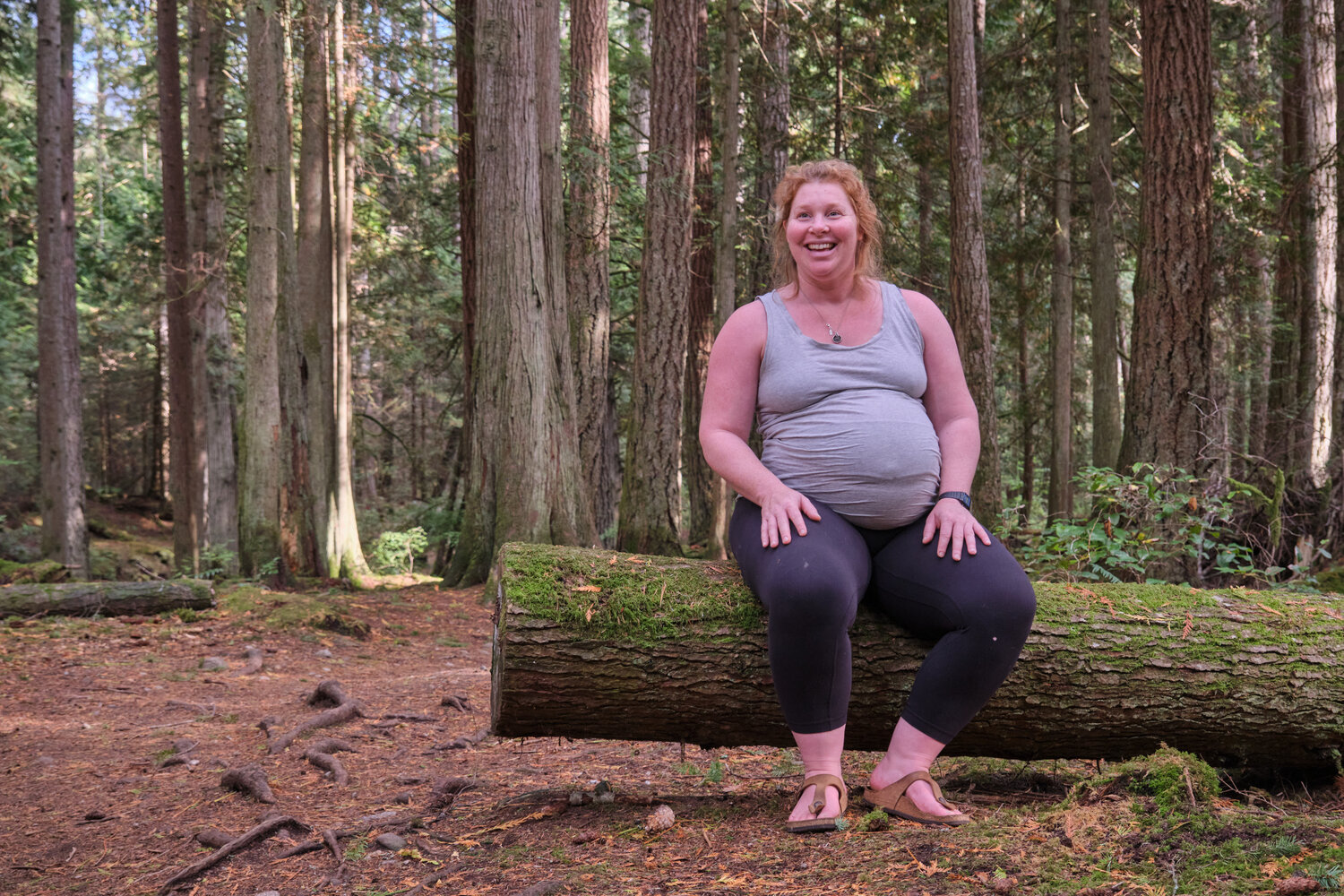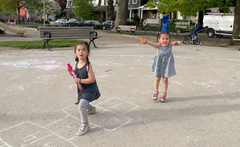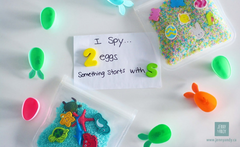
Photo courtesy of Wonder Outdoor School
If you’ve ever wanted to take a camping trip but thought, “how could I possibly go camping when I have a baby?”, this is your sign to go for it!
Camping is an amazing way to get outdoors, spend time with family, refresh your appreciation for nature, and also to teach your children about nature. Recently, children are opting to spend more and more time in front of a screen and less time outside. So when we introduce our children to nature from a young age, we instill in them a deeper love and appreciation for nature, not to mention all the benefits children can gain from playing outdoors.
Wonder Outdoor School
 Photo courtesy of Wonder Outdoor School
Photo courtesy of Wonder Outdoor School
Owned and operated by Christina Tutsch, Wonder Outdoor School is an inclusive and respectful community which empowers everyone to access the outdoors.
Personally and professionally, adventuring in the outdoors has been a capstone of Christina’s life. She has dedicated her career to outdoor education and guiding, most recently as Head of Outdoor Education at St. George’s School. She has lived in British Columbia for the last 11 years and has explored much of it by canoe, kayak, skis, bike, or by foot.
Christina offers various programs as well as coaching services, including outdoor education consulting, one-on-one planning, and custom courses.
On July 27, 2022, she'll even be doing a FREE online class (Outdoor Play Backpack Essentials and other Q&A) for the Jenny & Andy community.
Tips for Camping With Babies

Photo courtesy of Wonder Outdoor School
We summarized Wonder Outdoor School’s awesome blog posts Camping with Babies Part 1 and Camping with Babies Part 2 for you to get you started on your family camping trip:
-
Keep it Simple - Try to keep things as similar to life at home as possible. Babies like consistency and routine, so the more you can honour that, the smoother it will go. Try not to bring too many toys, only bringing a favourite book or plushie for a sense of consistency.
-
Layers - Bring many. Babies get wet a lot, and wet layers are cold for them. Focus on wool and synthetic fabrics as they dry faster and keep body temperature warm. Wonder Outdoor School suggests these layers: MEC Newt Suit, Smartwool Socks, fleece onesies, and Wee Woolies.
-
Bugs - Be ready for bugs. Be sure to have some anti-itch cream and band-aids ready to go. Many strollers come with bug nets that you can use for your backpack. You may even consider getting a bug tent.
-
Goals/Logistics - With babies, it’s important to dial-down your goals and objectives. Babies do sleep a lot and you can possibly do some longer hikes but you also need to stop to feed them, adjust their comfort, etc. With babies and toddlers, trips where you base camp can work best - so you only need to set up and take down camp once. Camp tasks take a lot longer to get done with littles.
-
Food - Depending on the age of your baby, food is pretty straightforward. Breastfeeding babies is pretty easy when camping (you can bring a chair for comfort). Once they are eating solids, simply feed your babies part of what you’re eating and have a healthy supply of fruit pouches. Reminder to put any clothing soiled with food in the bear cache.
-
Diapers and Hygiene - Bringing diapers when camping isn’t the most glamorous thing, to be honest. Wonder Outdoor School suggests bringing a few more than you usually bring and have a separate system for diaper garbage. Reusable diapers are also an option with its own pros and cons (lighter overall, but needs to be washed and dried).
-
Carriers - A good carrier is key. Carriers are a good way to ensure a nap happens if you’re hiking or if your baby is having trouble sleeping otherwise. If you’re an avid / regular camper, you can use a soft carrier and then graduate to a backpack once they are bigger.
-
First Aid - Pack your regular first aid kit with the supplies for illness and trauma (bleeding). But, also be sure to bring Baby Tylenol, Baby Benadryl and a snot sucker.
-
Sleep - When camping, sleeping for baby depends a lot on what you do sleep at home, and similar to at home, there is no one way to do it. There seems to be two general approaches to sleep while camping, of which you can use a combination:
Approach one is is co-sleeping. This is sleeping on the same surface as your baby, can work well when camping. You can monitor your baby’s temperature, nurse them, and it takes less space. Word of caution - this can mean potentially getting a bad sleep because everyone is wiggling all night, waking each other up.
The second approach is where your baby has a separate sleep surface, such as a travel crib, pea pod, or sleeping pad. This option can allow for times for the baby to be sleeping in the tent without you and it can mean a better sleep if your baby is used to having their own space. However, you’ll need to bring extra equipment that takes up more room in the tent.
For the full low-down on sleep, see Wonder Outdoor School’s Camping with Babies, Part 2.
On Pregnancy
 Photo courtesy of Wonder Outdoor School
Photo courtesy of Wonder Outdoor School
What about camping or getting more outdoor time while pregnant? In their post Pregnancy in the Outdoors, Wonder Outdoor School encourages people who are pregnant to stay active in the outdoors, but only if they feel up for it, making sure to listen to our bodies.
“Nature has a great deal to teach us as pregnant people (and our partners). It teaches us about strength and surrender… To be in nature while pregnant is healing, guiding and supportive.”
The post ends with beautiful encouragements and well wishes:
“My wish for all pregnant people is to get into nature in whatever way feels most nurturing. If that’s continuing to backpack or do multi-day trips, then that’s great. But if it is simply to sit and watch the birds then that is equally valuable. Listening to our bodies and what they need is important for learning to birth and parent; for me, these lessons and practices really started in pregnancy.”
The Love Languages of Camping

Camping presents many wonderful opportunities to show love and appreciation for our camping mates, whether it's a partner, best friend, or someone you’re getting to know. Wonder Outdoor School shares the universal love languages, but through the lens of camping, that will make the trip extra memorable:
-
Words of Affirmation
This love language is “verbal compliments that express love and affection”. When camping this could sound like:
♥ “That dinner you made was so delicious!”
♥ “I’m so impressed with how you pushed through that tough moment.”
-
Physical Touch
This love language is “sexual and non-sexual that shows love”. When camping this could look like:
♥ Giving lots of hugs - in the morning, before bed.
♥ A back or foot rub.
-
Quality Time
This is “focused and undivided attention together”. This is one of the love languages that is so often met through the experience of camping. Often away from work and screens, people find that they can be more connected. When camping this can look like:
♥ Sharing stories while looking at a fire or the stars.
♥ Having good conversation on the trail.
-
Acts of Service
This is “any act that eases the burden of responsibility”. Oh, there are abundant opportunities for this on a trip! This could look like:
♥ Setting up someone’s tent.
♥ Getting up early to make coffee and/or breakfast.
-
Gifting
This is “physical objects that reflect thoughtfulness and effort”. When camping we have limited stuff with us, but this could include:
♥ Bringing a surprise chocolate bar for when you get to camp.
♥ Sharing a beautiful item you’ve seen like a flower or a rock (but not to be picked and taken home according to Leave No Trace ethics).
Final Encouragement
"The most important thing is to just give it a try. Start in the backyard and add distance, length and challenge from there. Don’t forget, babies are adaptable and the more they do something, the better they get at it! The most important things is to share your joy with them."
Thank you to Wonder Outdoor School for providing such insightful tips and tricks for camping with babies. It might not exactly be an easy feat, but the experiences and lessons you can teach your children through camping and spending time outdoors will be invaluable.
For even more insight, we personally spoke with Christina Tutsch, the founder and owner of Wonder Outdoor School, about her experiences and love for nature. Be sure to check it out here!



